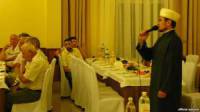New Muftiat and Mosque Seizures as Divide and Rule in the Crimea?

The first pronouncements by the head of a new mufftiat formed in the Crimea and a scandalous mosque seizure have aroused suspicion that the moves are aimed at creating a schism among Crimean Muslims and weakening the Mejlis of the Crimean Tatar People which has consistently opposed Russia’s occupation of the Crimea.
The formation of the ‘Tavrida Muftiat’ was announced on Aug 22 after a meeting of around 100 Muslims from different parts of the Crimea. Its name in full - the ‘Central Spiritual Directorate of Crimean Muslims’ - directly competes with the Spiritual Directorate of Crimean Muslims [SDCM]. The latter is the largest spiritual administrative centre of Ukrainian Muslims and its muftiat includes a representative of the Mejlis of the Crimean Tatar People.
The Tavrida muftiat, headed by Ruslan Saitvaliev, was formed with the assistance of the head of the Spiritual Directorate of Muslims of Russia. Shortly afterwards Saitvaliev gave an interview to a Russian newspaper in which he claimed that the majority of mosques in the Crimea are led by supporters of ‘non-traditional Islam’, specifically ‘vakkhabites’ or members of Hizb ul-Takhrir. Since Hizb ul-Takhrir is a banned organization in the Russian Federation, this is no small assertion. It is also nonsense.
SDCM has written to the High Mufti of Russia asking for an explanation and expressing concern that the latter is facilitating schism among Crimean Muslims. They ask for clarification as to the High Mufti’s role in the formation of the Tavrida Muftiat and for him to refute the worrying reports if they are false.
Roman Silantyev, described by well-known commentator Paul Goble as “notorious for his attacks on Muslims in the Russian Federation but close to the Moscow Patriarchate of the Russian Orthodox Church and Russian security agencies” had only positive things to say about the new muftiat in an interview given to ITAR-TASS. “This organization, previously known as the Spiritual Centre of Crimean Muslims has in the space of several months become one of the important Muslim forces of the Crimea – believers trust it more and more since the values of traditional, moderate Islam are espoused, without political slogans”.
He added that it has good prospects “since they’re supported by Muslims from other regions, in particular the High Mufti of Russia”.
On June 24 this same Silantyev asserted that “a lot of Muslim educational institutions are controlled by religious radicals”. He was commenting on the first search carried out of a Crimean madrasa, or Muslim school by armed and masked FSB officers who burst into the school when the 13 children were asleep.
Silantyev claimed that the madrasa might be “a base for religious extremists”, and that the Russian FSB are planning to “liquidate radical Islamic organizations in the Crimea”. Goble notes that “Silantyev has often been among the first Russian commentators to talk about crackdowns by the Russian security services and thus his predictions for what will happen next in Crimea and to its Muslims, most of whom are Crimean Tatars, needs to be taken seriously.”
Since that time there have been more raids of Muslim educational institutions and clerics’ homes, as well as of the homes of Crimean Tatar families. The FSB are ostensibly searching for ‘extremist literature’ which is not difficult to find given a list of prohibited books in Russia with well over two thousand titles and the fact that Ukraine has no such list. It is however very clear that the people targeted are accused of ‘extremism’ because, for example, they took part in protest over the 5-year-ban imposed, with force, on the world-renowned Crimean Tatar leader Mustafa Dzhemiliev returning to his native Crimea. Or, in the case of Mustafa Osmanov, because he provided the EuroMaidan protesters with hot food and has a Ukrainian flag on his car.
With elections to the Crimean parliament approaching, the occupation regime is using all methods to try to either coax Crimean Tatars to take part in the elections, or intimidate those who support the Mejlis which has called for their boycott.
It is likely that the effective seizure of the renowned Juma-Jami Mosque in Yevpatoria is linked and may not be the last of such religious land grabs. A group of Yevpatoria Muslims assert that the imam of the mosque, Elmar Abdulganiev decided to hold a meeting to elect new members of the community, without informing many of the members. A vote was taken in their absence with 12 new members elected. The community’s safe was also broken into and all the money taken.
It is unfortunately no surprise that the new members have refused to be under SDCM and have turned to the new Tavrida Muftiat.
In the six months since Russia’ invasion and annexation of the Crimea, the Mejlis or representative body of the vast majority of Crimean Tatars has refused to buckle under and accept Russian rule. The head of the Mejlis Refat Chubarov and a Mejlis adviser Ismet Yuksel have, like Mustafa Dzhemiliev, been banned from the Crimea for five years. Claims of ‘extremism’ have been increasingly used against the Mejlis and those who remain loyal to it. It is unfortunately likely that the creation, with Russian endorsement, of a new muftiat is part of this same offensive.





